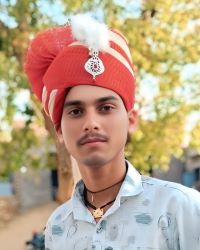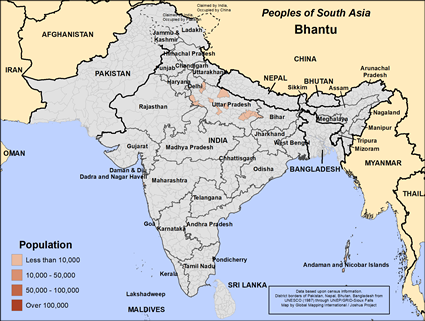Bhantu in India

Photo Source:
Anonymous
|

Map Source:
People Group data: Omid. Map geography: UNESCO / GMI. Map Design: Joshua Project
|
| People Name: | Bhantu |
| Country: | India |
| 10/40 Window: | Yes |
| Population: | 13,000 |
| World Population: | 13,000 |
| Primary Language: | Hindi |
| Primary Religion: | Hinduism |
| Christian Adherents: | 0.18 % |
| Evangelicals: | 0.00 % |
| Scripture: | Complete Bible |
| Ministry Resources: | Yes |
| Jesus Film: | Yes |
| Audio Recordings: | Yes |
| People Cluster: | South Asia Dalit - other |
| Affinity Bloc: | South Asian Peoples |
| Progress Level: |
|
Introduction / History
The Bhantu are a small population of Hindu people who live in north central India. They also known as Sahaisi or Sahasi, a word which means "brave." They were previously known as thieves. British colonialists listed them in their Criminal Tribes Act of 1871 as "criminal" caste. The stigma has stuck a century-and-a-half later – despite the Act's demise in 1952. Even though the Bhantu have found legal ways to make a living, their reputation are thieves continues today. They are found mostly in the Indian state of Uttar Pradesh. They speak own dialect with their families but are also conversant in Hindi which allows to communicate with those outside of their group. A tiny fraction of the Bhantu claim to be followers of Jesus Christ.
What Are Their Lives Like?
Today most Bhantu work in agriculture and animal husbandry. The Bhantu labor on land owned by higher castes. Some Bhantu work in low level government jobs and in the building trades. Some own small businesses. Men find a wife through family negotiations or by courtship. Commonly there is a bride-price, an amount of money given by the groom's family to compensate the bride's family for the loss of their daughter. As Hindus, the Bhantu will not eat beef.
What Are Their Beliefs?
Almost all of the Bhantu are Hindu. They observe all Hindu festivals and employ Brahmin priests to perform their religious rites. Shankar Bhagwan is their family deity and Sherawali Mata and Hanuman are village deities. Hindus believe that by performing rituals and good works that they will attain "moksha" or freedom from the endless cycle of birth, death and rebirth. The Bhantu visit Hindu temples and offer prayers, food, flowers, and incense to their gods in hopes of gaining protection and benefits. They do not have a personal or familial relationship with their gods as Christians do. There are many forms of Hinduism, each with its own deities and beliefs. The main yearly holidays of the Bhantu people are Holi, the festival of colors and the start of spring, Diwali, the festival of lights, Navratri, the celebration of autumn and Rama Navami, Rama's birthday. The caste system divides Hindus into four main categories. The lowest communities are outside of the caste system. The Bhantu fit into the working caste.
What Are Their Needs?
The level of literacy of the Bhantu is relatively high, but they struggle to find work due to their bad reputation. They need more access to higher and technical education. Bhantu who live in rural areas need access to modern medicine. They need good local schools for their children. Most of all the Bhantu must hear and understand the good news of Jesus Christ. He alone can forgive their sins and make them part of His family.
Prayer Points
Ask the Lord to give the Bhantu a spiritual openness to examine the claims of Jesus Christ. Pray for a disciple making movement that will bless the Bhantu people this decade. Pray for the Lord to send out workers to the Bhantu people to help them with their spiritual and physical needs.